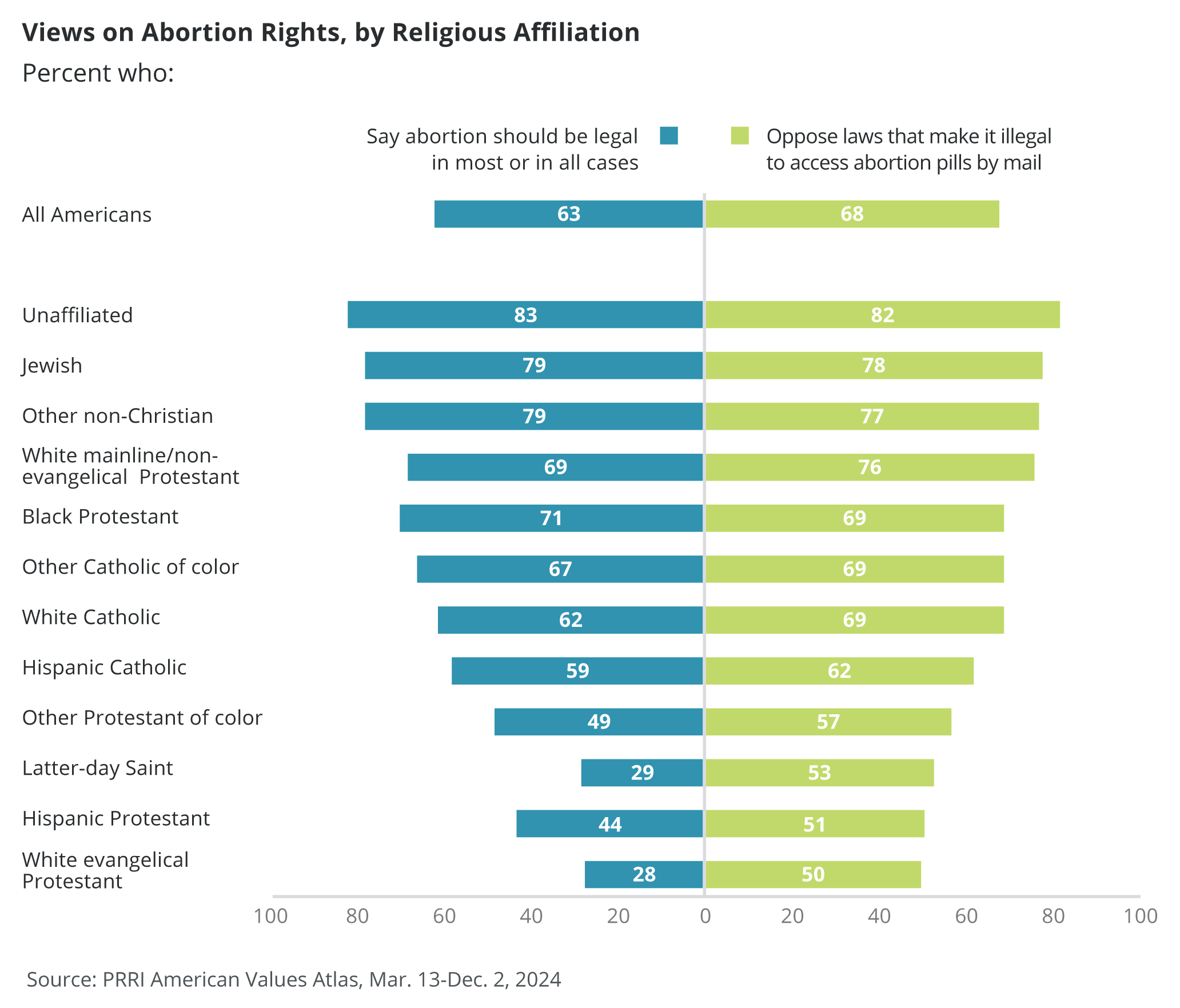Michal Raucher, Ph.D., is a 2024-2025 PRRI Public Fellow and Associate Professor of Jewish Studies at Rutgers, The State University of New Jersey. She teaches courses on religion and reproduction, women and gender in contemporary religion, and Israel/Palestine.
Project 2025, the federal policy agenda published by The Heritage Foundation, includes a proposal that will make it illegal to ship abortion medications across state lines. This guidebook for the Trump administration includes a plan to revive the Comstock Act, a 19th-century law that made it illegal to ship “obscene, lewd, [or] lascivious” materials over state lines. This law includes the mailing of materials “intended for producing abortion.” Legal experts have considered the Comstock Act irrelevant since the U.S. Supreme Court’s 1973 Roe v. Wade decision, but in recent years, anti-abortion activists have sought to use it to make it illegal to access abortion pills by mail. This Spotlight Analysis examines Americans’ conflicting views on abortion rights.
Enforcing the Comstock Act is deeply unpopular among the American people, which might explain why Trump has distanced himself from this part of Project 2025. Indeed, PRRI’s 2024 American Values Atlas shows that over two-thirds of Americans (68%) oppose laws that would make it illegal to use or receive FDA-approved drugs for abortion through the mail. While 81% of Democrats and 72% of independents are opposed to this, even a majority of Republicans (53%) oppose laws that make it illegal to ship abortion pills through the mail.
Furthermore, the majority of all religious groups oppose this implementation of the Comstock Act. For members of most religious groups, their opposition to laws that make it illegal to ship abortion pills is consistent with their general support for abortion. For example, 71% of Black Protestants say abortion should be legal in all or most cases, and 66% are opposed to laws that make it illegal to access abortion pills by mail. Among Jewish Americans, 79% say abortion should be legal in all or most cases, and 78% are opposed to laws that make it illegal to access abortion pills by mail. Over six in ten white Catholics (62%) support the legality of abortion, and 69% oppose laws that would make shipping abortion pills illegal. Similar trends are seen among Hispanic Catholics and white mainline/non-evangelical Protestants. These groups, too, are supportive of abortion legality and opposed to laws that would make it illegal to receive abortion pills through the mail.
However, some religious groups that have had lower levels of support for abortion legality show higher levels of opposition to banning the sending of abortion pills by mail. Just 28% of white evangelical Protestants, 29% of Latter-day Saints, and 44% of Hispanic Protestants think abortion should be legal in all or most cases. Yet, a higher percentage of these same groups are opposed to laws that would make it illegal to ship abortion pills through the mail. Slim majorities of white evangelical Protestants (50%), Latter-day Saints (53%), and 62% of Hispanic Protestants are opposed to these laws.

This inconsistency from religious groups that are otherwise opposed to the legality of abortion likely demonstrates their misunderstanding of the reality of abortion in the United States. While they are theoretically opposed to abortion in all or most cases, they are unaware of how common medication abortion is.
Most abortions in the United States today are medication abortions. As opposed to procedural abortions, the pills used in a medication abortion—mifepristone and misoprostol—can be taken at home. During Covid, these types of abortions became more common. In 2021, the Food and Drug Administration suspended the in-person requirement for prescribing medication abortions. In 2023, the FDA permanently suspended the in-person dispensing requirement, and as a result, more health care providers became certified in prescribing mifepristone and misoprostol to end a pregnancy, and online-only providers increased in the United States.
Medication abortion is considered a safe and reliable form of pregnancy termination. According to 2021 data from the Centers for Disease Control and Prevention, 81% of abortions occurred at 9 weeks gestation or earlier, and, in 2000, the U.S. Food and Drug Administration approved the use of mifepristone to terminate pregnancies up until the 10th week of gestation. Although many of the states with abortion bans in place have restricted access to telehealth abortion services, shield laws are currently protecting providers who are mailing the abortion pill to states where these restrictions exist.
PRRI’s survey question, which has been used since 2010, asks whether an individual thinks abortion should be “legal in all cases, legal in most cases, illegal in most cases, or illegal in all cases.” The question leaves participants free to make their own assumptions about which types of abortion are more or less common. Given the prevalence of gruesome images of fully developed terminated fetuses that are circulated by the anti-abortion movement, members of religious groups that tend to be more opposed to abortion likely think that most abortions occur later in the pregnancy. Therefore, they might erroneously think that medication abortion accounts for a minority of abortions in the United States. While telehealth and shipping abortion pills is not the most common way to receive abortion medication in the United States, its popularity has been growing over the past several years as more states have instituted abortion bans.
This widespread support for access to medication abortion, even among groups that say they are opposed to the legality of abortion, indicates that while there is theoretical opposition to abortion, better education about the reality of abortion might yield more support for the procedure.



![In an op-ed for @thehill, PRRI CEO Melissa Deckman, Ph.D., examines the narrative that Gen Z men are experiencing a “religious resurgence” — and why that may not hold up to the data.
Drawing on findings from the latest PRRI Census of American Religion, Deckman finds no evidence that Gen Z men are becoming more religious. In 2013, 32% of Americans aged 18 to 29 identified as religiously unaffiliated, which rose to 38% last year — an increase driven mainly by young women’s departure from religion. In 2013, just 29% of young women were religious “nones,” yet by 2024, it was 40%.
“If they [young men] are increasingly drawn to traditionalist churches, it could create yet another space where young women and men no longer spend time together, further widening what appears to be a growing gender divide across multiple fronts in society and politics.”
📖 Read more at thehill.com and explore the data at PRRI.org.](https://prri.org/wp-content/plugins/instagram-feed/img/placeholder.png)

